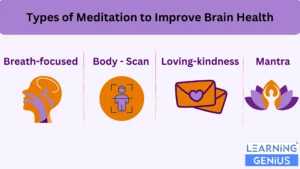You’ve always been a productivity junkie, following every tip and trick from the gurus on the internet.
But as you read and the hours tick by, you find yourself struggling to focus on your work. Your mind wanders, and you can’t seem to remember important details from your meeting earlier in the day.
You feel anxious, tense, and overwhelmed by the workload piling up on your desk.
That’s when it hits you – you’ve been so focused on your physical health that you’ve neglected your mental well-being. Your brain is a muscle that needs just as much attention and care as your body.
Imagine feeling clear-headed, focused, and in control of your thoughts and emotions.
By incorporating memory recall exercises into your daily routine, you can boost your cognitive function, improve your memory, and feel more confident in your abilities.
Are you ready to take the first step?
Table of Contents
ToggleMemory Recall Exercises You Can Follow Right Now
1. Meditate every day
Meditation comes in many forms and can be a useful tool for improving memory.

As you begin your meditation practice, find a quiet and comfortable space where you can sit or lie down. Close your eyes and take a deep breath, feeling the cool air fill your lungs and the warmth of your body as you exhale. Allow yourself to sink into a state of relaxation and let go of any thoughts or worries that may be weighing on your mind.
If you’re practicing breath-focused meditation, bring your attention to your breath and notice the sensation of the air moving in and out of your nostrils. Allow your breath to become your focal point and let any other thoughts or distractions drift away.
For body scan meditation, start by focusing on your toes and work your way up your body, bringing your attention to each part of your body as you go. Notice any areas of tension or discomfort and breathe into those areas, letting go of any tension with each exhale.
If you’re practicing loving-kindness meditation, begin by directing positive thoughts and feelings toward yourself. Repeat phrases such as “may I be happy” or “may I be at peace” and allow yourself to fully experience those emotions. Then, move on to directing those positive thoughts and feelings toward others, such as loved ones, acquaintances, and even strangers.
Finally, for mantra meditation, choose a word or phrase that has meaning to you and repeat it silently to yourself. Allow the sound and vibration of the mantra to fill your mind and let go of any other thoughts or distractions.
Remember that meditation is a practice and if done regularly, it will increase the gray matter in the brain’s hippocampus, which is responsible for memory and learning.
2. Brain Games — Sudoku is our Favorite
Do you remember the thrill of racing to solve the daily Sudoku puzzle in the newspaper as a child? There’s something uniquely satisfying about cracking a tough Sudoku puzzle, filling in the last number, and seeing the entire grid light up with completion.
It’s not only a fun game but also a great mental workout that can help improve concentration, memory, and problem-solving skills — making it an excellent tool for exercising your mind.
You can play it anywhere, at any time, with just a pencil and a Sudoku grid, or by using free Sudoku apps on smartphones and tablets.
Just fill in the grid with numbers from 1 to 9, ensuring that each row, column, and smaller 3×3 square contains all of the numbers without repetition. Start with easy puzzles and gradually work up to more challenging ones.
3. Learn complicated Math Formulas
Mental arithmetic is like a mental workout that trains your brain to process information quickly and accurately. By solving math problems in your head, you improve your focus, attention span, and problem-solving abilities. It’s like going to the gym for your brain.
The benefits go beyond improving math skills. It helps to train your brain to think critically, avoid distractions, and analyze information more efficiently. It’s a practical skill that can be used in everyday life, like calculating the tip at a restaurant or figuring out how much time it will take to save for a goal.
To incorporate mental arithmetic into your daily routine, ditch your calculators and start by practicing basic arithmetic problems. Gradually increase the difficulty.
You can use everyday situations as practice opportunities, like calculating the cost of groceries or estimating travel times. By making it a habit, you can improve your overall brain function and enhance your cognitive abilities.
4. Learn different Routes to your home/office
Has that ever happened to you? You find yourself driving to work or home, only to realize that you don’t remember a single part of the journey.
It’s like your mind was on autopilot!
That is why learning and actively remembering different routes to your destination can actually improve your memory.
When we challenge our brains by intentionally learning and memorizing new routes, we are strengthening our spatial memory and brain health.
This type of mental workout requires active engagement and helps our brains process, store, and recall information in a more efficient manner.
5. Be Open-minded
Being open-minded means approaching speed reading with flexibility and adaptability. You should be willing to try different techniques and approaches until finding what works best.
By adopting an open-minded mindset, you can avoid getting stuck in one way of thinking or doing things, leading to more effective and efficient speed reading.
Being open-minded also means being receptive to feedback and learning from others.
5. The Six Hats Method
Imagine you’re working on a project with your colleagues and a disagreement occurs.
Everyone is passionately expressing their opinions, but no one is really listening to each other.
The situation is getting heated and you’re starting to feel overwhelmed. That’s when you remember the Six Hats method!
- White Hat (Information): Start by wearing the white hat and gather all the facts and data related to the disagreement. Ask questions to gather more information and clarify any misunderstandings.
- Red Hat (Emotions): Next, put on the red hat and express your emotions and feelings about the situation. Allow others to do the same. This will help everyone understand each other’s perspectives and emotions.
- Black Hat (Caution): Put on the black hat and identify any potential risks or drawbacks of each solution. This will help you weigh the pros and cons and make a more informed decision.
- Yellow Hat (Optimism): Now, put on the yellow hat and focus on the benefits and opportunities of each solution. Look for the positive aspects and try to find a solution that maximizes the benefits.
- Green Hat (Creativity): Put on the green hat and let your creativity flow. Brainstorm new and innovative solutions to the problem. Encourage others to do the same.
- Blue Hat (Control): Finally, put on the blue hat and take control of the situation. Summarize all the ideas and solutions generated and choose the best one. Make a plan to implement the solution and ensure that everyone is on the same page.
6. Memory Palace
Imagine you’re studying for an exam and you need to remember the first 10 elements of the periodic table. Instead of just trying to memorize the list, you create a Memory Palace in your mind.
You pick a familiar place, like your childhood home, and associate each fact with a specific location in that place.
You start at the front door and associate each element with a different location inside the house.
Hydrogen is the doorknob, Helium is the couch, Lithium is the TV, and so on…
When it’s time to recall the information, you simply “walk” through your Memory Palace in your mind and retrieve the information as you go.
The physical act of walking through the house trains your brain to activate the neural pathways, making it easier to recall the information.
Also Read: Memorization Techniques: How to Improve Your Memory by 100X
7. Listening to songs in different languages
Have you ever tried to remember the lyrics to a song in a foreign language?
It’s like a mental workout for your brain.
When you listen to music in a different language, your brain has to work harder to understand the lyrics and melody.
This extra effort helps improve your memory and brain power, making it easier to recall new information.
Have you ever tried to remember the lyrics to a song in a foreign language?
It’s like a mental workout for your brain.
When you listen to music in a different language, your brain has to work harder to understand the lyrics and melody.
This extra effort helps improve your memory and brain power, making it easier to recall new information.
8. Sleep well
You’ve just spent the day cramming for an exam.
You stayed up late studying, fueled by caffeine and sugar, and finally hit the pillow exhausted.
The next morning, you wake up feeling groggy and foggy-headed, and as you sit down to take the exam, you realize that you can’t seem to recall any of the information you studied.
The recommended sleep time for adults is 7-9 hours per night. When we sleep, our brains are quite active, and this is essential for overall brain health and memory consolidation.
9. Yoga
Yoga is like giving your brain a workout and a massage all at the same time.
When we practice yoga, we focus on our breathing and movements, which helps calm the mind and reduce stress. This, in turn, improves our memory and focus.
So, how can you start incorporating yoga into your schedule?
- Find a quiet, comfortable space where you won’t be disturbed.
- Set aside 10-15 minutes a day for yoga practice.
- Start with basic yoga poses and breathing exercises.
- Focus on your breathing and movements, and try to clear your mind of other distractions.
- Gradually increase the duration and difficulty of your yoga practice as you get more comfortable
10. Learn Different Dance Moves
By learning different dance styles and forms, you are constantly challenging your brain to remember new movements and patterns, which can help improve your memory and cognitive function.
But, you don’t have to be a professional dancer to experience the benefits.
The goal is to incorporate some form of physical activity into your schedule
Here are a few actionable steps to help you get started:
- Find a dance style or form that interests you, whether it’s salsa, hip hop, or ballroom dancing.
- Take a class or watch tutorials online to learn the basic steps.
- Practice regularly, even if it’s just for a few minutes a day
- Have fun! Dancing should be enjoyable, so don’t be too hard on yourself if you make mistakes. Just keep practicing and having fun.
Frequently Asked Questions
- Does Physical exercise improve memory?
Yes, physical exercises can improve memory. Studies have shown that regular exercise increases blood flow, which helps keep your brain fit and can even lead to the growth of new brain cells. So, don’t just sit there twiddling your thumbs, get up and move. Your memory will thank you.
- How do memory exercises improve brain health and function?
Mental exercises such as puzzles, board games, memory games, and brain teasers can improve memory and brain function by strengthening neural connections and promoting neuroplasticity. This can lead to better information processing and memory, increased focus and concentration, and prevent cognitive impairment.
- What are some brain exercises to improve short-term memory?
Brain exercises such as jigsaw puzzles, memory palace, and brain teasers challenge and stimulates your brain, which can help improve your short-term memory. These exercises help to strengthen the connections between neurons in the brain, which can improve brain health and help reduce the risk of age-related memory or cognitive decline.
- What are some Memory Recall Exercises for Students?
The best memory recall exercise for students is visualization, association, and practice. Create mental images to associate with information you want to remember. Then, Connect new information with things you already know and practice as much as you can
- What are some Memory Exercises for Adults to prevent Alzheimer’s disease?
Learning a new skill, meditation, brain games, and participating in social activities like group events can improve brain function and prevent memory loss for adults including the onset of Alzheimer’s.
Unleash Your Memory Potential: Join Dave Farrow's Transformational Memory Course
Discover the secrets to a supercharged memory with Dave Farrow’s exclusive course. Master memory techniques, improve focus, and unlock your cognitive potential. Enroll now and start your journey towards a razor-sharp memory! Don’t miss out on this life-changing opportunity.
What Next?
There you have it,
The Best Memory Recall exercises to improve your memory and concentration
Now we would like to hear from you.
Which exercises from this post are you ready to try first?
Are you going to learn different routes to your office?
Or maybe you want to try the evergreen Memory Palace technique?
Either way, let us know in the comment below right now


